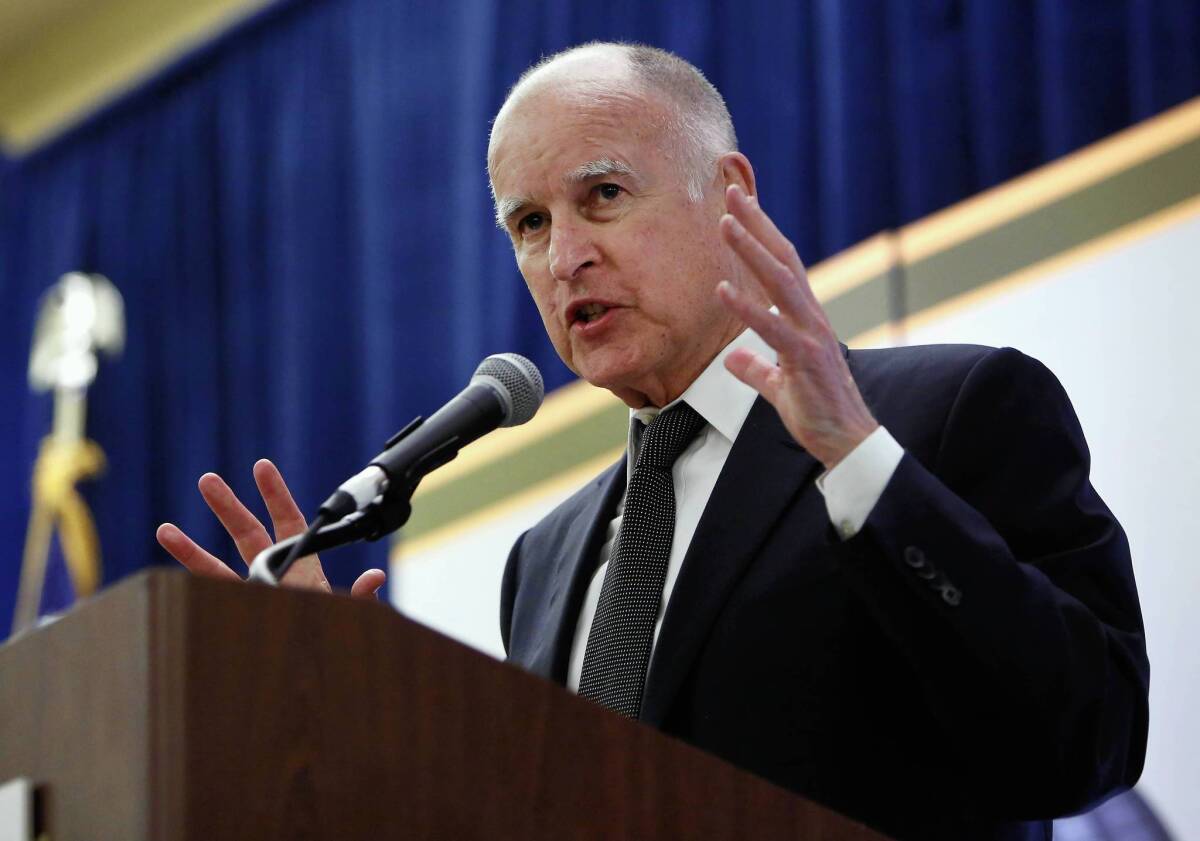Legislators, Brown backpedal on public records bill

- Share via
SACRAMENTO — Facing a growing outcry, Gov. Jerry Brown abandoned a plan Thursday that threatened to reduce public access to government records.
Brown had been poised to sign a measure, passed by the Legislature as part of the budget last week, that would have freed local governments from requirements to provide records to Californians quickly and in electronic form.
Brown sought the change because making compliance optional would remove the state’s obligation to reimburse local authorities for their efforts, potentially saving the state tens of millions of dollars.
The Legislature’s leaders reversed course in the wake of protests from news organizations, open-government groups and others across the state, and Brown followed suit.
“We support the legislative leaders’ approach, which will eliminate uncertainty about local compliance with the law and, on a permanent basis, ensure that local government pays for what has long been its explicit responsibility,” said Evan Westrup, a spokesman for the governor.
Open-government activists have argued that access to public documents is essential to holding governments accountable, as shown in the city of Bell when documents provided evidence of financial misconduct by city officials.
The San Francisco Chronicle editorial page called the proposal “destructive,” and the San Jose Mercury News accused the governor and legislators of “gutting the law.” Considering the California proposal alongside others in the country, the Los Angeles Times editorialized: “It sometimes seems like there is a raging epidemic of government contempt for public access.”
Voters flooded the Capitol with letters and emails arguing against the proposed change, officials said, and it was a hot topic on social media sites.
The Assembly passed a replacement bill Thursday that would rescind the proposed changes.
Senate leader Darrell Steinberg (D-Sacramento), who had said Wednesday that he stood by the original measure, backed down and announced he would put the new bill to a vote next week.
He made the statement after a closed-door meeting of the Senate Democratic Caucus, which overwhelmingly agreed that the Senate should act on the new Assembly bill.
“The consensus was, everybody wanted to fix this,” said Sen. Lou Correa (D-Santa Ana). “Public access to government records is a pillar of our democracy.”
Some lawmakers, including Sen. Leland Yee (D-San Francisco) — last week’s sole Democratic vote against changing the records act — had openly called for new action even before the caucus meeting. As the Assembly debated the issue Thursday, budget committee Chairman Robert Blumenfield (D-Woodland Hills) explained the lower-house reversal.
“A lot of folks are waking up on this issue, and there is a hue and cry about it, and we want to be responsive to that,” he said.
Later in the day, Steinberg and Assembly Speaker John A. Pérez (D-Los Angeles) issued a joint statement: “We agree there needs to be both an immediate fix to ensure local entities comply with the California Public Records Act and a long-term solution so the California Public Records Act is not considered a reimbursable mandate.”
The leaders said they intend to propose a constitutional amendment that would require local governments to comply with all provisions of the state records act and to absorb any expense incurred in the process — a move Brown has said he would support.
Such a proposal, which would go before voters in June of next year, would “give voters the chance to make clear that good government shouldn’t come with an extra price tag,” the statement from Steinberg and Pérez said.
Advocates said that in addition to the short-term solution contained in the new bill, they are excited to see the issue possibly being resolved permanently with the proposal to put public record rules in the California Constitution.
“The constitutional amendment is the absolute best solution to the problem,” said Jim Ewert, general counsel for the California Newspaper Publishers Assn. “It completely bypasses the requirement that the state reimburse local agencies for essentially performing a fundamental duty.”
Steinberg said the constitutional amendment, by taking the state off the hook for local compliance costs, could free tens of millions of dollars for other important state programs.
Several Republicans, including Assemblyman Tim Donnelly of Twin Peaks, said that Democrats have only themselves to blame for rushing through hundreds of pages of budget bills without enough consideration.
The fast-track approach means the public is sometimes late in realizing when proposals are problematic, officials said.
“This is an embarrassment that we have to stand here today and redo the work we just did,” Donnelly said.
Assembly Republicans voted against the bill, saying it contained other objectionable provisions that would hurt business and reduce record-keeping requirements on domestic violence incidents.
Times staff writer Anthony York contributed to this report.
More to Read
Sign up for Essential California
The most important California stories and recommendations in your inbox every morning.
You may occasionally receive promotional content from the Los Angeles Times.











